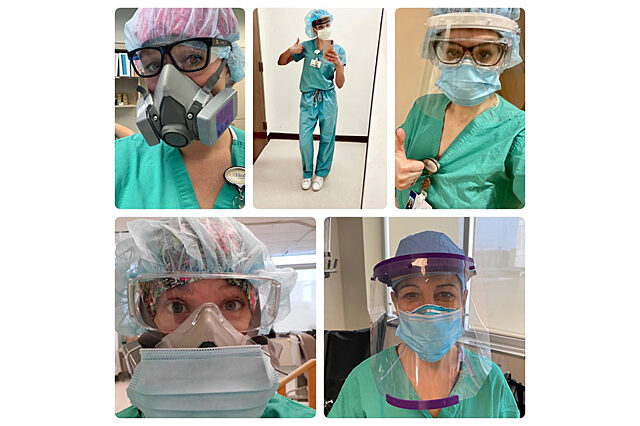Speech-Language Pathology and COVID-19
Breathing, swallowing and communicating are critical functions of the human body. COVID-19 can impact any of these functions, which is why speech-language pathologists, or SLPs, play an important role in recovery.

SLPs featured from top left: Elizabeth Kriechelt, Hayley Robinson, Ashlee Walker. From bottom left: Julie Speulda and Leslie Miller.
Breathing, swallowing and communicating are critical functions of the human body. COVID-19 can impact any of these functions, which is why speech-language pathologists, or SLPs, play an important role in patient recovery and rehabilitation from the virus.
How can SLPs improve breathing and swallowing for COVID-19 patients?
In severe cases of COVID-19, a patient may be on a ventilator for a long period of time, which can lead to muscle weakness of the entire body, including the throat muscles. When these muscles are impacted, the ability to safely swallow food is also impacted.
During the swallowing process, it is common to hold your breath for a split second to keep food from going into your lungs. When COVID-19 causes shortness of breath, the lungs can’t afford to take that brief time for airway protection and makes swallowing unsafe. Any additional amounts of supplemental oxygen, specifically higher amounts, can also push food into the airway. This occurrence is similar to eating while sticking your head out the window on a highway. In turn, these side effects from COVID-19 can cause harmful risks when eating.
SLPs complete swallow therapy with COVID-19 patients to improve swallow strength, range of movement, coordination with breath and diet modifications.
How do SLPs improve communication skills for COVID-19 patients?
Sometimes following intubation, patients have difficulty utilizing their vocal cords to express their needs with nurses or doctors.
Vocal cord deficits can range from hoarseness due to lack of use, vocal cord paralysis due to intubation risks or even redirected airflow through a tracheostomy tube taking away all air required to produce voice.
This is when SLPs step in. Therapists practice vocal exercises with patients to improve function and utilize speaking valves to reroute air through the vocal cords, restore the ability to cough and reinstate natural pressure in the airways.
How do SLPs improve cognition for COVID-19 patients?
Delirium, or “brain fog,” is common in COVID-19 patients and can impact their length of stay and discharge disposition.
In addition, some patients with COVID-19 may have suffered a stroke or other such injuries to the brain, requiring expertise from SLPs to improve their awareness and cognitive abilities to return home safely and independently.
Visit UFHealthJax.org/rehabilitation-services to learn more about speech therapy and other services offered at UF Health.
About the author
